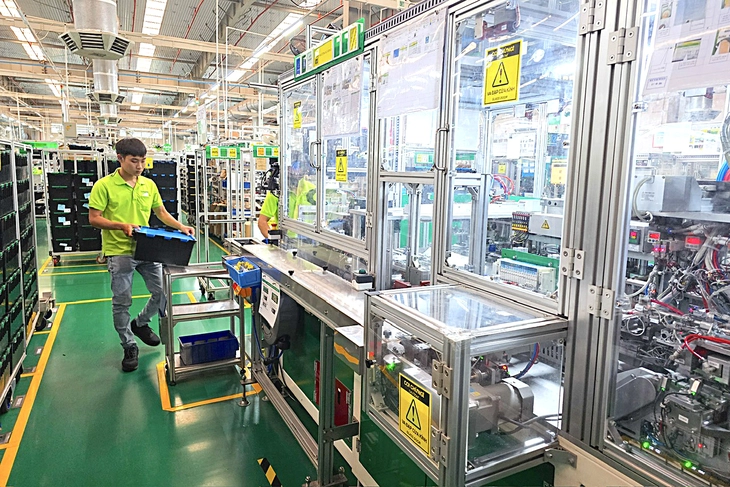Vietnam's semiconductor industry witnessed remarkable growth in 2024, generating an impressive US$18.7 billion in revenue, mostly fueled by foreign direct Investment (FDI) enterprises which have invested approximately $11.6 billion in the sector.
Domestic firms still play a limited role in the semiconductor industry.
According to the Ministry of Planning and Investment, which recently merged with the Ministry of Finance, there are currently 174 registered FDI projects in Vietnam’s semiconductor sector, with a total capital investment of nearly $11.6 billion.
This number is expected to grow significantly in the coming years.
Major global semiconductor giants such as Intel from the U.S., Marvell Technology from the U.S., Samsung from South Korea, CoAsia SEMI from South Korea, and Renesas from Japan have already established a presence in Vietnam, underscoring the country's rising prominence in the industry.
Booming FDI operations
The expansion of FDI enterprises in Vietnam is evident. In early February 2025, U.S.-based Amkor Technology, one of the world's top three outsourced semiconductor assembly and test providers, applied for approval to triple its factory capacity in northern Bac Ninh Province to produce 3.6 billion semiconductor units per year.
Amkor’s facility, set to be fully operational by October 2025, will employ around 7,200 workers and feature an automation rate of 70 percent.
According to Amkor’s management, Vietnam's strategic geographic location – close to major electronic component manufacturing hubs like China, Thailand, and South Korea – ensures stable supply chains and competitive costs.
Le Quang Dam, CEO of Marvell Vietnam LLC, a subsidiary of Marvell Technology, believes that Amkor’s expansion signals Vietnam’s ability to meet the demands of global semiconductor manufacturers.
This move reflects long-term investment commitments and highlights Vietnam’s growing role in semiconductor packaging and testing within the global supply chain.
In addition to Amkor, South Korean company Hana Micron has invested approximately $600 million in a semiconductor packaging and testing facility in northern Bac Giang Province since 2019, with plans for further expansion.
American semiconductor companies are also expanding their presence in Vietnam.
Marvell Technology, a fabless semiconductor firm specializing in research, development, and chip design, has operated in Vietnam since 2013.
The company currently employs 470 staff members, 98 percent of whom are engineers.
According to Dam, the number of semiconductor design firms in Vietnam has grown by approximately 20 percent over the past two years.
Other industry leaders, including Nvidia, Google, Qualcomm, Synopsys, Faraday, and Infineon, continue to recruit engineers in Vietnam, signaling a rising demand for skilled workers in the sector.
Challenges: Few domestic firms, skilled engineers
Despite its rapid and strong growth, with revenue reaching $18.7 billion last year, Vietnam’s semiconductor industry still faces challenges, particularly regarding domestic ownership, according to an industry expert.
While revenue is high, most profits are retained by FDI companies rather than local firms. The number of Vietnamese companies engaged in semiconductor design, commercialization of semiconductor intellectual property cores, and chip manufacturing remains relatively low, the expert explained.
“Vietnam faces a shortage of highly skilled engineers capable of designing and commercializing complete semiconductor products. Vietnamese engineers typically participate in projects as team members rather than as lead designers or decision-makers. Even when they contribute to semiconductor design, their involvement is often limited to specific stages rather than complete product development,” he elaborated.
Nguyen Thanh Yen, general director of CoAsia SEMI Vietnam, part of CoAsia SEMI, pointed out that Vietnam’s first wave of semiconductor design engineers emerged around 20 years ago, coinciding with the rise of smartphones. Today, a similar trend is occurring with AI chips.
A key development in the past two decades has been the emergence of thousands of Vietnamese semiconductor design engineers and workers in packaging and testing facilities. Many Vietnamese engineers are now employed in advanced semiconductor markets worldwide, maintaining strong international connections.
Yen believes these engineers form the foundation for Vietnam’s future semiconductor startups.
“No industry has ever received as much attention as the semiconductor sector does today. The most critical challenge is maximizing the current opportunities while leveraging the industry's internal strengths," he said.
Government support, future goals
To accelerate the growth of the domestic semiconductor industry, the Vietnamese government has introduced policies to support local companies.
Under a new resolution promoting technological innovation and digital transformation, domestic enterprises setting up their first semiconductor manufacturing facility will receive financial support covering 30 percent of their total investment, up to a maximum of $10 billion. However, to qualify for these incentives, companies must complete factory construction and begin production before December 31, 2030.
Additionally, businesses investing in semiconductor projects can allocate 10-20 percent of their taxable income annually to high-tech research and development funds. The total allocation cannot exceed the total project investment.
As part of Vietnam’s semiconductor industry development strategy for 2030, with a vision toward 2050, the government aims to train 50,000 semiconductor engineers and specialists by 2030 and increase annual semiconductor industry revenue to over $25 billion.
Like us on Facebook or follow us on X to get the latest news about Vietnam!

















































